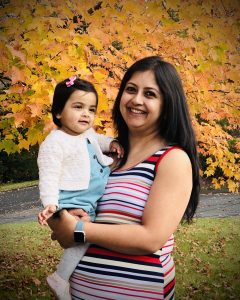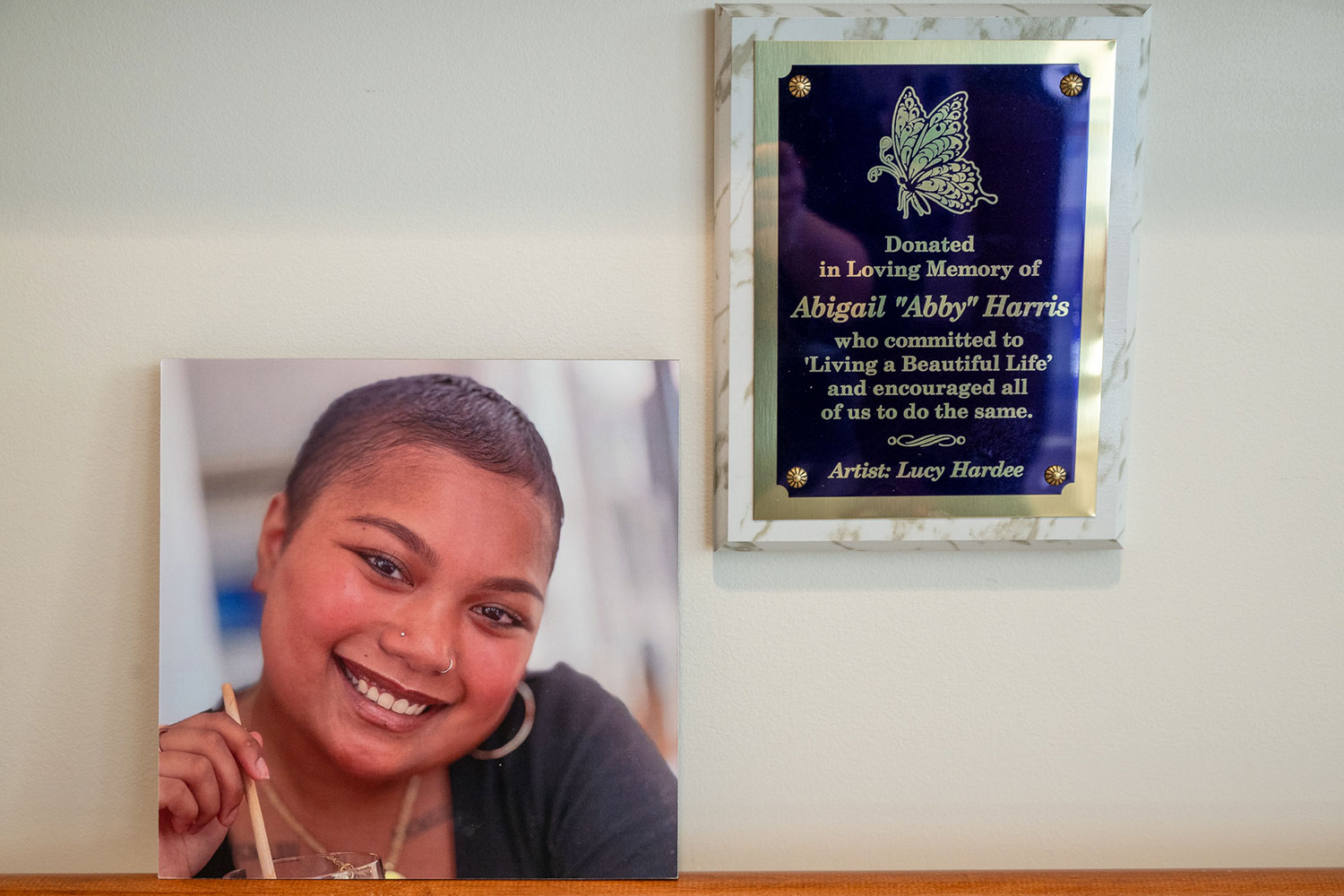Paramita Dhar ’11 Ph.D., of South Windsor, has a true bundle of joy to celebrate this Thanksgiving.
Thanks to UConn Health’s Neurosurgery, Neuro-Ophthalmology, OB/GYN, Maternal-Fetal Medicine, Internal Medicine, and Endocrinology teams all working together, on Nov. 25 the associate professor of economics at Central Connecticut State University is celebrating one year of being brain-tumor-free, her vision restored from the brink of blindness, and her daughter’s first birthday.
“Last year I was pregnant in the middle of COVID, and just noticed some blurriness in my left eye suddenly around the second week of October,” says Dhar, 41, who thought it was just a pregnancy symptom that would go away. But as her pregnancy progressed, she started to lose her vision significantly in that eye, and her ophthalmologist suggested seeing a neuro-ophthalmologist soon.
At 33 weeks pregnant, with 75% vision lost in one eye, two days before Thanksgiving, 2020 she went for a neuro-ophthalmologist assessment at UConn Health with Dr. Lakshmi Leishangthem, who put her on steroid treatment and immediately ordered an MRI.
On Thanksgiving morning, Dhar received the diagnosis while sitting in the UConn John Dempsey Hospital.
“I had a brain tumor and it was rapidly compromising my vision. It was located on my optic chiasma, affecting my left eye’s vision initially and spreading quickly to my right eye. I needed brain surgery as soon as possible, but my baby was due in 7 to 8 weeks,” says Dhar, who was faced with the prospect that she may never see her newborn child.
She adds: “I was getting very close to being blind and the doctors were really racing against time. Together they came up with a solution that was best for me and my baby.”
First the baby needed to be delivered early and safely. The Saturday after Thanksgiving, her baby was born via emergency C-Section at UConn John Dempsey Hospital’s Labor and Delivery unit, weighing just four-and-half pounds. Dhar and her husband named the girl Adwitiyaa, which means “unique.”
“The NICU staff, the OB/GYN and Labor & Delivery doctors and everybody were amazing,” Dhar says. “Then the whole crew of doctors and nurses started prepping me for my brain surgery. I was given blood transfusion to make my body recuperate from the C-section and get it ready for the upcoming brain surgery.”
On Dec. 2 her neurosurgical team, led by UConn Health’s Chief of Neurosurgery Dr. Ketan R. Bulsara, performed a successful brain surgery to remove the fast-growing tumor and help restore her vision.

“They opened my skull and took the tumor out in a seven-hour long surgery, all while my baby was right there in the NICU, my husband waiting in the Labor and Delivery unit and my 6-year-old son at home with my sister.”
Dhar says, “Thank God the tumor was benign. Once it was gone I could see again – and did not permanently lose any of my vision. Today my vision is back to 20-20.”
According to neuro-ophthalmologist Leishangthem, this very rare tumor, called a diaphragm sellae meningioma, can sometimes occur in pregnant women due to high progesterone and estrogen hormone levels that cause the tumor to grow rapidly. And in Dhar’s case, it happened to compress the most vital area where both the nerves from each eye crossed together, thus affecting the left eye and showing early signs of involving the right eye.
“I’m very happy for her,” says Leishangthem. “It was a big team effort.”
Dhar’s neurosurgeon couldn’t agree more.
“This is truly a reflection of the great collaborative team work at our institution. Paramita underwent a complex skull base operation involving a cranial orbital osteotomy for tumor resection. I could not be happier that her vision came back, she is cured of her tumor, and has a very healthy baby. She is even back to working as a college professor,” says Bulsara.
Bulsara added: “I am grateful to Paramita and her family for their absolute faith in our multidisciplinary teams, and I truly celebrate the world-class expertise present in all the UConn Health teams I got to work with during her care and beyond.”
“I feel very, very thankful,” says Dhar, adding that the team collaboration at UConn Health is what she is most thankful for. “I must say it was very, very good teamwork.”
Just like her mother, Adwitiyaa turned out to be a fighter, and is doing well one year after her early arrival, Dhar says.
“We were in good hands. The care we got from UConn Health was priceless. We thank them from the bottom of our heart.”


